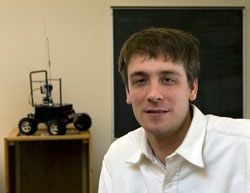
Associate Professor of Computer Science Devin Balkcom explores how robots can help humans learn. (photo by Joseph Mehling ’69)
Devin Balkcom, associate professor of computer science, believes that robots will be a crucial part of our future world.
In 2004, Balkcom’s origami folding robot—his dissertation project—caught the attention of national media, gaining coverage in the Pittsburgh Post-Gazette, The Seattle Times, and New Scientist among others. In 2009, his lab created a robot that could fold t-shirts. Today, he works with undergraduate and graduate students in his lab to solve everyday problems using robotics.
One project under way stems from Balkcom’s days in graduate school, when he was also working as swim coach: How can you teach someone to swim efficiently with the aid of technology? The trick was to avoid making the technology intrusive. Paritosh Kavathekar, a PhD candidate in computer science and a member of the Balkcom Robotics Lab who specializes in assisting human motion tasks with minimal feedback, is working on a method they call “human marionettes.” As the techniques become more nuanced in the future, says Balkcom, they could have applications in physical training and health care, particularly through aiding physical therapy.
Watch Devin Balkcom discuss “human marionettes,” the possibilities of knot tying machines, and how robot geodesics can apply to factory efficiency.

